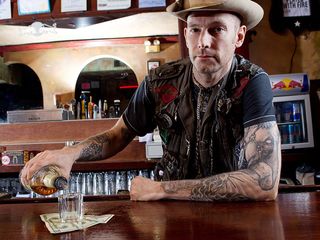
Hank3 picks 10 essential country artists
Shelton Hank Williams, better known as Hank Williams III – or Hank3, as he prefers to be addressed – is a direct descendant of country music royalty. But like his legendary grandfather and his celebrated father, Hank Williams Jr., he has always explored different genres and subgenres of the sounds his family popularized.
“If you really look at all the Hanks, none of them were full country,” Hank3 says. "Hank Sr. might have been the king of country, but he was playing rock ‘n’ roll before anybody else. And look at his Luke The Drifter stuff: That music was so sad and depressing, they couldn’t get it on a jukebox, so that’s why he started going by another name.”
Long estranged from his father, Hank3 does see similarities in how the two have spread the waters of country music. “Hank Jr. gravitated towards Southern rock and the Allmans, so he never stayed full country. As for me, being a drummer helped me get into other styles. If I get to 50, I might kick it back a little and approach the shows like Kris Kristofferson or Willie Nelson. We’ll see how it pans out.”
Last year, Hank3 issued two wildly diverse albums, the double country disc Brothers Of The 4x4 and the punk-infused single LP A Fiendish Threat (the latter is an offering from his new project "3"). Come June, he'll hit the road in the US, and he promises his show will feature a little bit of everything. "I always pay respects to country for the first hour and a half of my show, and then I move on," he says. "Country is in my blood, even though I’m not pure country.”
Hank3 Spring 2014 Tour Dates are as follows:
6/3 - Louisville, KY @ Mercury Ballroom
6/4 - Newport, KY @ Southgate House
6/6 - Huntington, WV @ V Club
6/7 - Morgantown, WV @ 123 Pleasant St
6/8 - Columbus, OH @ A&R Bar
6/10 - Cleveland, OH @ House of Blues
6/11 - Rochester, NY @ Montage Music Hall
6/13 - Buffalo, NY @ Town Ballroom
6/14 - Syracuse, NY @ Lost Horizon
6/17 - New York, NY @ Gramercy
6/18 - Philadelphia, PA @ The Trocadero
6/20 - Baltimore, MD @ Rams Head
6/21 - Norfolk, VA @ NorVA
6/22 - Raleigh, NC @ Lincoln Theatre
You can purchase Brothers Of The 4x4 at Amazon, along with A Fiendish Threat. For tickets and additional info, visit Hank3's official website. On the following pages, Hank3 runs down his picks for 10 essential country artists, listed alphabetically.
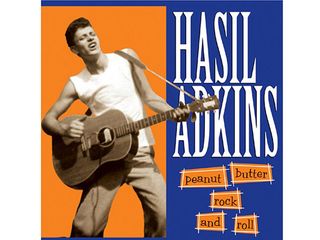
Hasil Adkins
“He was an original, no doubt. Hasil was one of those amazing underdogs whose brain worked differently from everybody else’s. The way that we conceived of his guitar playing and singing, and even just the way that he talked – he was a big inspiration to a lot of musicians out there. The Cramps paid a lot of respect to him, as did blues and country artists, as well.
“I was glad to be introduced to his music and to be able to watch these documentaries on him. Then I got a chance to take the stage with him, and I actually got to know him, which was a huge deal.
“What he did with psychobilly was pretty phenomenal, but he always loved country music and blues. He kept that hardcore West Virginia, let’s-have-a-good-time theme going for the most part, but you could really feel some genuine emotions in his darker, depressing hard-drinking songs. I could relate to Hasil. Also, the fact that he was his own drummer kind of helped give him his own sound. He wasn’t pretty, but he was real.”
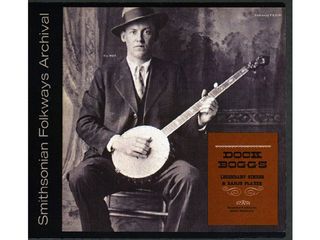
Dock Boggs
“The blues banjo has always stood out to me, and Dock was one of the best on the instrument. There’s also his voice – I could identify with that high, nasal-y sound. You put those two things together, the voice and the banjo, and I’m in.
“He’s another guy who got into the music business and had a good run for a bit, but he had some dark times and didn’t pick up his instrument for almost 25 years. He was real, and he was writing about some pretty raw stuff. He did the gambling and the hard livin'. The man was eatin’ it, livin’ it, breathin’ it. He even robbed some people in an alley, got busted and did some time in jail. Then he got out of jail and went back to playing his music for whiskey. That was his thing.
“But he was so talented. He even beat the Carter Family at a competition once. Despite all the drama that was his life, he created his own little weird musical niche.”
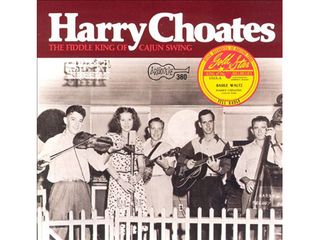
Harry Choates
“It’s a sad story with Harry. He was an amazing Cajun fiddle player in the 1940s, but he died early, before he actually turned 40. He leaves behind one of those only-the-good-die-young legacies.
“He wrote some timeless songs that even people like Bruce Springsteen have covered. And if you’re a fiddle player – not necessarily a violinist, but a fiddler – then you’ve definitely covered one of Harry’s songs. Sawin’, good-time, mountain-type fiddle players are familiar with his sound. Jole Blon and Rye Whiskey are just two of his great, great songs.
“He had a really nice career going, but he had a kid and couldn’t make the child-support payments. He ended up getting a little too drunk and wound up in a jail cell. One story goes that he was beaten to death, and another one goes that he kept running into the wall and knocked himself into a coma. That was that. He had about a seven-year run, but the music he made is timeless.”
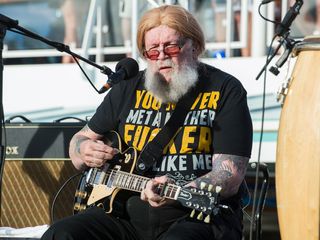
David Allan Coe
“He’s been kind of like a grandfather to me. He’s one of the few guys in the business I can call for advice and expect a straight-up answer. He’s watched me grow up, I’ve watched him do his thing – we have a lot of history together.
“He’s said some pretty wild things and done some pretty wild things, but he was raised in a lot of correctional facilities; there’s just another kid of philosophy when you come up in that kind of environment. With age, he’s become more humble, and he’s glad to be out there telling stories.
“Being able to open up for him and vice-versa, record songs with him, and just talking to him, it’s been an unbelievable experience. I’ve opened up for George Jones, Johnny Paycheck, a lot of the greats, but there’s just something about him that’s beyond that. He’s had a number one song, gone to court and lost everything, the whole bit. There’s a lot of knowledge that he’s tried to pass down to me.
“David Allan Coe and Johnny Paycheck, the way that they sing those outlaw songs, there’s something about it. The fans know it and latch right onto it.”
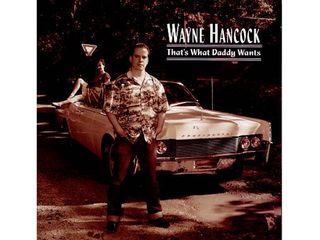
Wayne Hancock
“Wayne 'The Train.' He’s been my running buddy, and he's taught me a lot. When I got signed to Curb Records, I started listening to songs to put on my record. In addition to my own songs, I wanted to record a few numbers by a couple of outsiders. Every time I heard Wayne’s stuff, it stood out to me as being very special.
“I got to meet him when he was recording in Nashville. Within 30 minutes, we’d been in a wreck and got both of our names on a police report. It was just one of those things that were meant to be.
“I went to Texas and saw how he made his records. He made me understand what he considered pure when it came to swing and blues and country music. The only other guy who has more Hank Williams in him than me is Wayne ‘The Train’ Hancock. It’s that loud singing style, which is not an easy thing to put across. Wayne knows about being blackballed in Nashville and having to pick up and start all over. He’s done it, he’s been there, and he keeps on going.
“Very few people can be real purists, but Wayne is a purist all the way. The styles that he absorbed, he keeps them intact 100 percent. And I have to mention, Wayne’s been in a bad accident. We’re hoping he can come back next year and be able to sing and play again.”
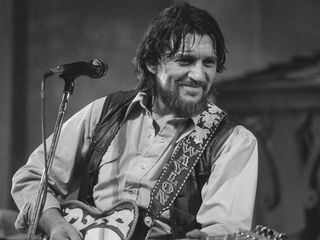
Waylon Jennings
“Growing up, I always wished that Waylon was my dad. He was always a humble guy, although he could be mean as a snake if he felt like it. Every time I was around Waylon, he just had a way of sharing stories and giving advice. He was a very special human being.
“As it is with George Jones, I put on Waylon when I want to get pumped up or brought way down. There’s something about Waylon’s sound that makes him different from Johnny Cash or Willie. His guitar style, what he’s singing about and how he lived it – you hear the music and you know the man.
“Compared to Cash and Jones, he went pretty quickly, but we were all glad to have him for all the extra time that he was around. He cheated death with that one plane ride, the one that killed Buddy Holly, so that’s pretty remarkable.
“He had a tough life, though. I remember seeing him on stage one time, and David Allan Coe, almost crying, looked at me and said, ‘Man, Waylon’s up there, and I can see that he’s dying. He’s giving all that he’s got, but it’s like I’m saying goodbye to him at the same time.’ It was hard and really emotional at the end. Waylon would try to take the stage when he could barely stand and sing. He gave it all till the end.”
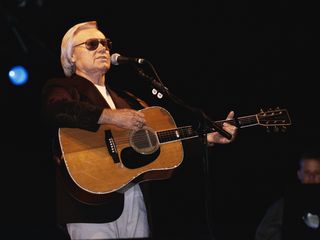
George Jones
“He lived a lot longer than most people thought he would, and he was still able to get out there and do it to it. It was a hard singing style. What George Jones and Johnny Paycheck did, it was super-hard. But George was blessed with one of those voices, just like Ray Charles and Willie Nelson – all you have to do is hear two notes and you know who it is.
“He had a great career, a great family, so many friends and stories. It was really scary the first time I sang with him. I remember asking somebody, ‘What are we gonna sing? What song are we doing?’ And all I was told was, ‘He’ll tell you on stage.’ That was it. Luckily, he picked out a Hank Williams song – I think it was I’m So Lonesome I Could Cry – so it was all good.
“George’s music is something special. If I’m trying to get pumped up, I’ll put on some of his earlier stuff; if I’m trying to get down and out, well, he’s got a lot of down-and-out songs, too. The way that he sang, the production, the way that the songs were captured – it’s way intense. His songs will be around for all eternity.”
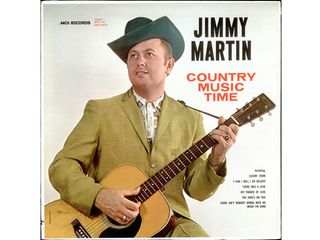
Jimmy Martin
“When you’re talking bluegrass in Tennessee, there’s Bill Monroe and Jimmy Martin, two giants. Not only was Jimmy one of the real kings of bluegrass; he was also an incredible person and a true character. A lot of people don’t have the drive that he had. He lived both sides of it, enjoying commercial success but also being the underdog.
“All in all, he was very passionate till the day he died about what he did and what he stood for. Being from Tennessee, I could relate to him – the coon dogs and that way of life. My granddad on my momma’s side of the family, that’s what he used to do when he wasn’t farming. He’d run those dogs – that was his hobby.
“Songs like Tennessee and Old Pete, I could really latch on to them. He was something else. It was a shame when we lost him. The good come and go, but I was just glad to be around while he was here.”
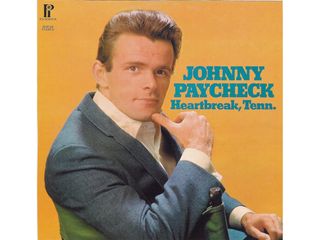
Johnny Paycheck
“I knew Johnny, and I know Johnny’s son. We were all under the same management for a while. The thing I remember about Johnny is those eyes of his. He had these eyes that could cut right through you. I would watch him on stage fighting the oxygen tank, but those eyes were always so full.
“He went through so many changes during his life. I saw him escorted to the stage by the biker gangs, but it wasn’t always that way; when he started out, he was that clean-cut Nashville-looking guy. The Ohio boy eventually went with the beard and the scraggly hair and the biggest cowboy hat you could put on a guy. His music was a real part of him – it was him. All you needed to do was listen to what he sang and how he sang it, and you knew the deal.”
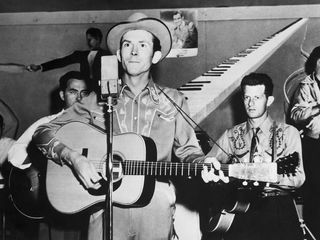
Hank Williams
“It’s a little strange, my relationship with my grandfather. I never met him, of course, so I only know him through his music. Me and Hank Jr, it’s not like we’ve been that close, so the family bond is a little weird. But I know never to compare myself to Hank Sr. – it’s just impossible.
“I’m reminded of my family tree all the time in so many ways. I’ll just go to the grocery story, and somebody will say, ‘You look so familiar…’ And I’ll say, ‘Well, it’s probably because I’ve got Hank Williams’ blood in me.’
“Hank knew that he wasn’t going to be around for long, so he got as much work done while he could. There wasn’t much film made of him, but the recordings were captured. It’s a lot to take in, the music and the history. It’s funny, because he’s a legendary musician, but he’s also my grandfather. The way that I absorb it all is pretty unique, I’ll admit.
“The way that he would write songs and sing them fascinates me. Some of those shows they were doing were at seven o’clock in the morning. To be able to sing at that time of day and be that ‘on,’ that’s pretty intense. And I love the natural tremolo in his voice. He could deliver a song like nobody else. And, of course, he put the pen to the paper, capturing emotions that were genuine and pure.
“The early, raw stuff gets to me the most. It’s hard for me to listen to the strings on his later recordings or things that they tried to go back and redo. For me, 1947 to ’52, that’s when you had the most amazing collection of songs. I’ll always listen to that era and be knocked out. Who wouldn’t be?”

Joe is a freelance journalist who has, over the past few decades, interviewed hundreds of guitarists for Guitar World, Guitar Player, MusicRadar and Classic Rock. He is also a former editor of Guitar World, contributing writer for Guitar Aficionado and VP of A&R for Island Records. He’s an enthusiastic guitarist, but he’s nowhere near the likes of the people he interviews. Surprisingly, his skills are more suited to the drums. If you need a drummer for your Beatles tribute band, look him up.

“In an age of artifice, media management and manufactured pop stars she’s come through as a breath of fresh air": Inside the making of Adele's seminal second album, 21

"A corporate turn-off, and not for me like it used to be": Neil Young will not, repeat not, be playing Glastonbury, blaming BBC demands "we were not interested in"

“In an age of artifice, media management and manufactured pop stars she’s come through as a breath of fresh air": Inside the making of Adele's seminal second album, 21

"A corporate turn-off, and not for me like it used to be": Neil Young will not, repeat not, be playing Glastonbury, blaming BBC demands "we were not interested in"
Most Popular








